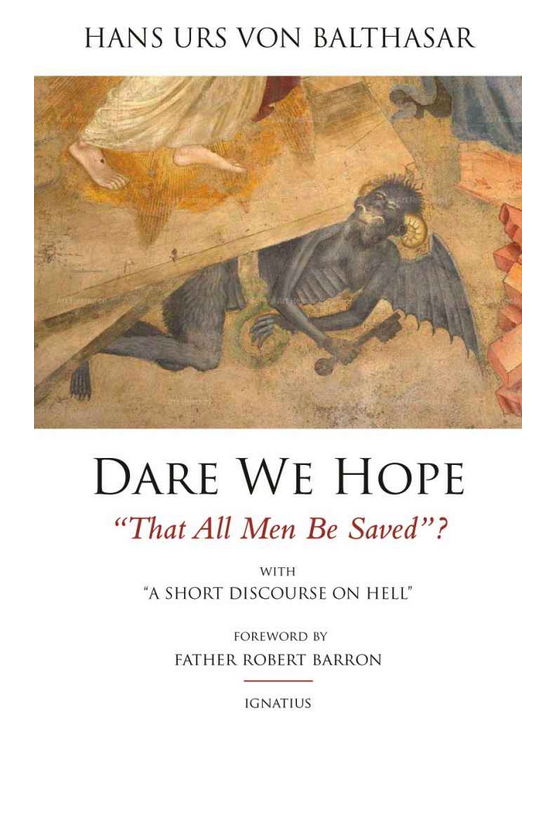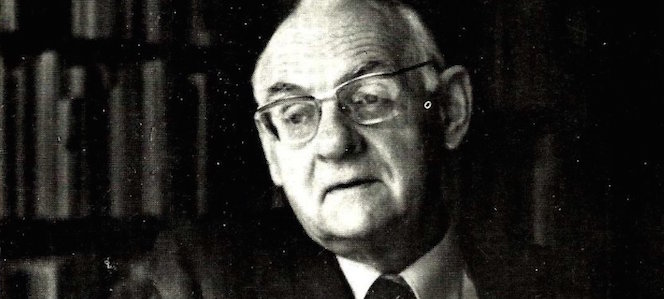Just over twenty five years ago, Ignatius Press published the first English translation of a book by the Swiss theologian Hans Urs von Balthasar, a man esteemed by St. John Paul II and Pope Benedict XVI. Titled Dare We Hope That All Men Be Saved? With a Short Discourse on Hell, the book combined two small works originally published in German in 1986 and 1987. The book remains one of the most discussed theology books of the twentieth century as well as one of the most controversial. Some readers vigorously defend Balthasar’s views on Hell and salvation, while others label him a universalist, someone certain that all people will be saved.
If you have not yet read the book, now is a good time. This week, Ignatius Press released a beautiful new edition of Dare We Hope That All Men Be Saved?, for which Fr. Robert Barron wrote a Foreword. We strongly encourage you to pick up a copy. You should also browse the new website they launched, BalthasarBooks.com, to learn about the man Henri de Lubac called “the most cultured man in Europe.”
Today we are happy to share Fr. Barron’s entire Foreword to the book, along with two videos he filmed on the life and work of Hans Urs von Balthasar.
Foreword to Dare We Hope That All Men Be Saved?
It is curious indeed that a text so often characterized as advocating an easy “universalism” in regard to salvation, actually commences with a clear statement that all human beings stand under the divine judgment. Whatever else Hans Urs von Balthasar says in this book, the one thing he is quite clearly not saying is that we have certain knowledge that all people will be saved. But he will insist—in fact, it is the gravamen of his argument—that we are permitted to hope that Hell might be empty of human beings. That this proposition is controversial was evident from the moment this book was published and it remains evident today. Take even the most cursory look at the extensive and vehement internet conversation surrounding this issue if you doubt me. In the opening pages of his book, Balthasar himself mentions a number of theologians and journalists who dismissed his speculations out of hand, some even questioning his orthodoxy. In very recent times, certain theologians have opined that Balthasar’s “universalism” has contributed mightily to the decline of the Church’s influence in the West and to an attenuating of its missionary impulse. In the more popular forums of discussion, one hears that Balthasar’s point of view runs counter to the explicit teaching of Jesus and to the witness of many of the saints.
 How does Balthasar (and how can his advocates today) respond to these criticisms? His first move is to remind defenders of a crowded Hell that the Biblical witness in regard to this issue is, to say the least, complex. Alongside of the many references to Hell and those who will suffer therein, there are at least as many Biblical evocations of universal salvation. To cite simply a few of the best known: “And I, when I am lifted up from the earth, will draw all people to myself” (Jn. 12:32); and “He has made known to us the mystery of his will…as a plan for the fullness of time, to gather up all things in him, things in heaven and things on earth” (Eph. 1:9-10); and of course, “This is right and is acceptable in the sight of God our Savior, who desires everyone to be saved and to come to the knowledge of the truth” (1 Tim. 2:3-4). That these passages rule out the certitude that many are in Hell and justify at least the hope that Hell might be empty strikes Balthasar as self-evident.
How does Balthasar (and how can his advocates today) respond to these criticisms? His first move is to remind defenders of a crowded Hell that the Biblical witness in regard to this issue is, to say the least, complex. Alongside of the many references to Hell and those who will suffer therein, there are at least as many Biblical evocations of universal salvation. To cite simply a few of the best known: “And I, when I am lifted up from the earth, will draw all people to myself” (Jn. 12:32); and “He has made known to us the mystery of his will…as a plan for the fullness of time, to gather up all things in him, things in heaven and things on earth” (Eph. 1:9-10); and of course, “This is right and is acceptable in the sight of God our Savior, who desires everyone to be saved and to come to the knowledge of the truth” (1 Tim. 2:3-4). That these passages rule out the certitude that many are in Hell and justify at least the hope that Hell might be empty strikes Balthasar as self-evident.
The testimony of the Fathers is, he convincingly shows, just as multivalent and textured. To be sure, Augustine and many of his colleagues in the Christian West advocated the harsh view that the vast majority of the human race—the massa damnata—will find their way to Hell. However, this teaching was countered by many weighty fathers in the Christian East, including Gregory of Nyssa, Maximus the Confessor, and especially Origen of Alexandria, all of whom taught universal salvation, or something quite close to it. It is, therefore, simply not the case that a clear patristic consensus exists around the issue of a crowded Hell. Furthermore, practically all of the Fathers, both East and West, reject the view that Hell—empty or not—is created by God. Rather, they hold that it is brought about by sinners themselves, whose resistance to the divine love produces suffering in them. In this context, Balthasar cites C.S. Lewis, who famously argued that the door to Hell is locked from the inside by those who, from the bottom of their hearts, want to be left alone.
I believe it is fair to say that the recovery of these elements, brought about through the nouvelle theologie’s thorough-going resourcement, both biblical and patristic, contributed to a development of doctrine in regard to the issue under consideration. Without ever embracing Origen’s apokatastasis panton, Balthasar affected a sort of Origenizing of Augustine, a nuancing of the massa damnata theology which, by the early twentieth century was found increasingly incredible and indeed un-Scriptural. This development has been rather clearly confirmed in the magisterial teaching of the Church, especially in the Vatican II document Lumen Gentium and Pope Benedict’s encyclical Spe Salvi, both of which offer interpretations of our question that are infinitely more generous than anything in the Augustinian tradition.
The most striking and original contribution that Balthasar makes to this discussion, I believe, is his critique of Thomas Aquinas’s view—shared widely in the classical tradition—that part of the joy of heaven is to witness the sufferings of the damned. To this he contrasts the approach of a surprising number of saints and mystics, who declared a willingness to suffer on behalf of a denizen of Hell or even, at the limit, to take his or her place as a gesture of love. The prototype here is St. Paul himself, who says in the ninth chapter of Romans: “I wish that I myself were accursed and cut off from Christ for the sake of my own people, my kindred according to the flesh” (Rom. 9:3). The possibility that his fellow Jews might be separated from Christ does not awaken in Paul anything even vaguely resembling gloating self-satisfaction, or even delight in the divine justice, but rather a mercy that conduces to utter self-sacrifice.
Balthasar draws our attention to a number of female mystics who share this Pauline attitude: Mechtild of Hackeborn, Angela Foligno, Therese of Lisieux, and Catherine of Siena. A conversation between Christ and Catherine is especially illuminating. Fired by the hope that all people might be saved, Catherine said to Jesus, “How could I ever reconcile myself, Lord, to the prospect that a single one of those whom you have created in your image and likeness should become lost and slip from your hands?” The answer that the Lord gives her, confided to her spiritual director Raymond of Capua, is breathtaking: “Love cannot be contained in Hell; it would totally annihilate Hell.” In other words, the love that Catherine is exhibiting, precisely through her hope that all be saved, functions as an antidote to the poison, or according to her own metaphor, an obstacle to the entrance of Hell. She tells her Lord, “If I could remain united with you in love while, at the same time, placing myself before the entrance of Hell and blocking it off in such a way that no one could enter, that would be the greatest of joys for me.”
Stated abstractly and dispassionately—are there many or few who are saved?—the question remains finally unanswerable, and Balthasar acknowledges this. However, Christ’s own journey to the limits of godforsakenness, to which the saints just mentioned bore witness, provides ample ground for the hope that all might come to salvation. Because of God’s acrobatic display of love—the Son going all the way down to the very bottom of sin and death and then being drawn back to the Father in the power of the Holy Spirit—we may reasonably hope that even those who have wandered furthest away from God will be drawn into the dynamics of the divine life. Edith Stein—still another female saint who vibrantly envisioned the possibility of universal salvation—said that human freedom can, in principle, stand definitively athwart God’s love; but given what God has accomplished in Christ, it can be, so to speak, “outwitted.”
I should like to conclude with just a word about the implications of Balthasar’s position for mission and evangelization. As I suggested above, some hold that the lively hope for universal salvation would conduce to indifferentism: if all will be saved anyway, why bother with preaching, teaching, going on missionary journeys, etc? But this is so much nonsense. The God of the Bible delights in working through secondary causes. Therefore, the ardent witness of deeply committed evangelists, teachers, and missionaries might well be precisely the means by which God deigns to bring his people to eternal life. The hope for the salvation of all ought not to dampen the missionary spirit, but rather to stir it up.
This is why I believe that this text, much debated from the time of its publication, will prove indispensably important to the task that all of the post-conciliar Popes have placed before the Church, namely, the work of the new evangelization.
